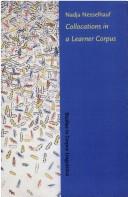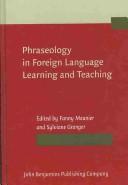| Listing 1 - 5 of 5 |
Sort by
|
Multi
ISBN: 9781107029545 9781107609501 9781139342100 110760950X Year: 2015 Publisher: Cambridge Cambridge University Press
Abstract | Keywords | Export | Availability | Bookmark
 Loading...
Loading...Choose an application
- Reference Manager
- EndNote
- RefWorks (Direct export to RefWorks)
Lexicology. Semantics --- Psycholinguistics --- Sociolinguistics --- Language and languages --- Phraseology --- Vocabulary --- Figures of speech --- Idioms --- Education, Bilingual --- Study and teaching --- Language and languages - Study and teaching --- Phraseology - Study and teaching --- Vocabulary - Study and teaching

ISBN: 9027222851 1588115240 9789027222855 9786612157004 1282157000 9027294739 9789027294739 9781282157002 6612157003 Year: 2005 Volume: 14 Publisher: Amsterdam Philadelphia J. Benjamins Pub. Co.
Abstract | Keywords | Export | Availability | Bookmark
 Loading...
Loading...Choose an application
- Reference Manager
- EndNote
- RefWorks (Direct export to RefWorks)
Collocations are both pervasive in language and difficult for language learners, even at an advanced level. In this book, these difficulties are for the first time comprehensively investigated. On the basis of a learner corpus, idiosyncratic collocation use by learners is uncovered, the building material of learner collocations examined, and the factors that contribute to the difficulty of certain groups of collocations identified. An extensive discussion of the implications of the results for the foreign language classroom is also presented, and the contentious issue of the relation of corpus linguistic research and language teaching is thus extended to learner corpus analysis.
Collocaties --- Fraseologie --- Phraseology --- Taal en talen --- didactiek. --- Study and teaching. --- Language and languages --- Study and teaching --- Grammar, Comparative and general --- Semantics --- Terms and phrases --- Foreign language study --- Language and education --- Language schools --- Phrases --- Syntax --- LANGUAGE ARTS & DISCIPLINES --- Linguistics / General --- Languages & Literatures --- Philology & Linguistics --- Language and languages Study and teaching --- Language and languages - Study and teaching --- Phraseology - Study and teaching
Book

ISBN: 1282194690 9786612194696 3110199165 9783110199161 3110196301 9783110196306 9781282194694 6612194693 Year: 2008 Publisher: Berlin Boston
Abstract | Keywords | Export | Availability | Bookmark
 Loading...
Loading...Choose an application
- Reference Manager
- EndNote
- RefWorks (Direct export to RefWorks)
Mastering the vocabulary of a foreign language is one of the most daunting tasks that language learners face. The immensity of the task is underscored by the realisation that it is not only single words but also numerous standardised phrases (idioms, collocations, etc.) that need to be acquired. There is thus a clear need for instructional methods that help learners tackle this task, and yet few proposals for vocabulary instruction have so far gone beyond techniques for rote-learning and familiar means of promoting of noticing. The reason for this is that vocabulary and phraseology have long been assumed arbitrary. The volume offers a long-overdue alternative by exploring and exploiting the presence of linguistic 'motivation' - or, systematic non-arbitrariness - in the lexicon. The first half of the volume reports ample empirical evidence of the pedagogical effectiveness of presenting vocabulary to learners as non-arbitrary. The data reported indicate that the proposed instructional methods can benefit when both the nature of the target lexis and the basic cognitive orientations of particular learners are taken into account. The first half of the book mostly targets lexis that has already attracted a fair amount of attention from Cognitive Linguists in the past (e.g. phrasal verbs and figurative idioms). The second half broadens the scope considerably by revealing the non-arbitrariness of diverse other lexical patterns, including collocations and word partnerships generally. This is achieved by recognising some long-neglected dimensions of linguistic motivation - etymological and phonological motivation, in particular. Concrete suggestions are made for putting the non-arbitrary nature of words and phrases to good use in instructed language learning. The volume is therefore of interest not only to applied linguists and researchers in Second Language Acquisition/Foreign Language Teaching, but also to second and foreign language teaching professionals.
Language and languages --- Vocabulary --- Phraseology --- Grammar, Comparative and general --- Semantics --- Terms and phrases --- Foreign language study --- Language and education --- Language schools --- Study and teaching. --- Phrases --- Syntax --- Diction --- Lexicology --- Language and languages Study and teaching --- Study and teaching --- Vocabulary - Study and teaching --- Phraseology - Study and teaching --- Cognitive Linguistics. --- language teaching.
Book
ISBN: 9781788924856 1788924851 1788924878 1788924886 178892486X Year: 2021 Volume: 148 Publisher: Bristol, UK: Multilingual matters,
Abstract | Keywords | Export | Availability | Bookmark
 Loading...
Loading...Choose an application
- Reference Manager
- EndNote
- RefWorks (Direct export to RefWorks)
"This is the first book to investigate the field of phraseology from a learner corpus perspective. It includes cutting-edge studies which analyse a wide range of multiword units and extensive learner corpus data to provide the reader with a comprehensive theoretical, methodological and applied perspective onto L2 use in a wide range of situations"--
Language and languages --- Phraseology --- Second language acquisition --- Study and teaching --- Foreign speakers --- Language and languages - Study and teaching - Foreign speakers --- Phraseology - Study and teaching --- Second language acquisition. --- LANGUAGE ARTS & DISCIPLINES / Linguistics / Psycholinguistics. --- Second language learning --- Language acquisition --- Grammar, Comparative and general --- Semantics --- Terms and phrases --- Foreign language study --- Language and education --- Language schools --- Foreign speakers. --- Study and teaching. --- Phrases --- Syntax

ISBN: 9789027232670 9789027232441 902723244X 9786612151996 1282151991 9027291314 9027232679 9789027291318 9781282151994 Year: 2008 Publisher: Amsterdam Benjamins
Abstract | Keywords | Export | Availability | Bookmark
 Loading...
Loading...Choose an application
- Reference Manager
- EndNote
- RefWorks (Direct export to RefWorks)
This book addresses the key role of phraseology in second language acquisition and instruction. It is divided into three main sections: Extracting and Describing Phraseological Units investigates the role played by native and learner corpora in the extraction and description of multiword units, two initial and crucial steps in informing language pedagogy; Learning Phraseological Units deals with the learning aspect, an oft-neglected yet essential dimension of phraseology in second/foreign language pedagogy, this section also addresses issues in new literacies; and Recording and Exploiting Phraseological Units focuses on pedagogical tools, notably monolingual and bilingual dictionaries and textbooks. This stimulating collection presents cutting edge research in the field and identifies major avenues for future theoretical and applied work. It is of particular relevance to researchers and teachers interested in the patterned nature of language.
--Phraséologie --- --Study and teaching. --- #KVHA:Fraseologie --- 802.0-07 Engels: taalonderwijs; taalverwerving --- Engels: taalonderwijs; taalverwerving --- #KVHA:Taalonderwijs --- 800 --- 37 --- 800.7 --- 802.0-07 --- 801.3 --- 801.3 Lexicografie. Woordenboeken --- Lexicografie. Woordenboeken --- 800.7 Taalonderwijs. Taalverwerving --- Taalonderwijs. Taalverwerving --- 800 Taalwetenschap. Taalkunde. Linguistiek --- Taalwetenschap. Taalkunde. Linguistiek --- 37 Opvoeding en onderwijs --(algemeen) --- Opvoeding en onderwijs --(algemeen) --- Language and languages --- Phraseology --- Fraseologie --- Taal en talen --- Study and teaching. --- didactiek. --- Grammar, Comparative and general --- Semantics --- Terms and phrases --- Foreign language study --- Language and education --- Language schools --- Study and teaching --- Phrases --- Syntax --- Lexicology. Semantics --- Didactics of languages --- Langues --- --Enseignement --- 37 Education --- Education --- Language and languages Study and teaching --- Language and languages - Study and teaching. --- Phraseology - Study and teaching. --- Enseignement --- Phraséologie
| Listing 1 - 5 of 5 |
Sort by
|

 Search
Search Feedback
Feedback About UniCat
About UniCat  Help
Help News
News